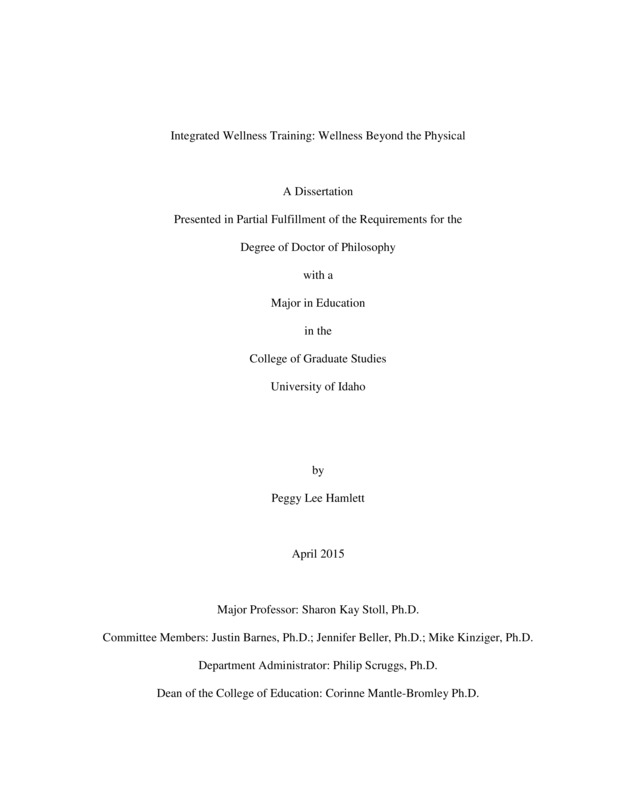Integrated Wellness Training: Wellness Beyond the Physical
Hamlett, Peggy Lee. (2015). Integrated Wellness Training: Wellness Beyond the Physical. Theses and Dissertations Collection, University of Idaho Library Digital Collections. https://www.lib.uidaho.edu/digital/etd/items/hamlett_idaho_0089e_10524.html
- Title:
- Integrated Wellness Training: Wellness Beyond the Physical
- Author:
- Hamlett, Peggy Lee
- Date:
- 2015
- Keywords:
- Physical Mental Training Well-Being Wellness
- Program:
- Movement & Leisure Sciences
- Subject Category:
- Education; Educational leadership; Recreation and tourism
- Abstract:
-
Abstract
A paucity of research exists which has examined the effect of cognitive knowledge on understanding integrated wellness and its effect on physical health. The purpose of this study was to examine cognitive knowledge of total well-being in college aged students (19 to 25 years) through a 14 week instructional program focused on integrated wellness. The instructional intervention was developed to help students understand the difference between physical health and overall well-being. The study design employed a quasi-experimental nonequivalent control group design, where the intervention consisted of 40 participants and control consisted of 60 participants.
A significant difference was found with the interaction of time (pre, mid, final) X group (Rec, intervention course, Pilates control group course) on Rickel objective Values Inventory scores F (2, 61) = 9.2, p = .0001, partial eta 2 = .23. The Pilates class was significantly lower at the pre 32.8 + 4.3 Rickel Objective score compared to the Rec 370 class 36.7 + 7.9. The Pilates class remained lower throughout the pre, mid, and final Rickel Inventory scores compared to the recreational course scores, thus showing the intervention to be effective.
A significant difference was found with the interaction of time (pre, mid, final) X group (recreational course, Pilates course) on Rickel subjective Values Inventory scores Wilks' Lambda F (2, 61) = 6.3, p = .003, partial eta 2 = .17. The Pilates class was significantly lower at the pre 32.8 + 4.3 Rickel Objective score compared to the rec class 36.7 + 7.9. The Pilates class remained lower throughout the pre, mid, and final Rickel Inventory scores compared to the recreational course scores. The Pilates class scored significantly lower at all times periods Pre 21.2 + 4.9, mid 22.7 + 4.9, and final 23.48 + 5.2 compared to recreational class pre 26.3 + 4.3 mid 25.8 + 4.7 and final 26.3 + 5.1 scores.
A significant difference was found by time (pre, mid, final) on the Hamlett Well-Being Inventory scores Wilk’s Lambda F(2,61) =8.4, p = .01, partial eta2 = .22. A significant difference existed between pre 66.31 + 6.3, mid 67.48+6.4, and final 69.12+6.4 Hamlett Well-Being Inventory scores. No significant difference was found with the interaction of time (pre, mid, final) X group (rec course, Pilates course) on Hamlett Well-Being Inventory scores Wilks' Lambda F (2, 61) = 1.57, p = .22.
These results indicate the intervention appeared to be effective in causing a change in student’s perception of total well-being. The open-ended questions also reinforced those findings with student’s responses. Future research should focus on an integrated wellness curriculum to help students become committed to exercise.
- Description:
- doctoral, Ph.D., Movement & Leisure Sciences -- University of Idaho - College of Graduate Studies, 2015
- Major Professor:
- Stoll, Sharon K
- Committee:
- Barnes, Justin J; Beller, Jennifer M; Kinziger, Mike
- Defense Date:
- 2015
- Identifier:
- Hamlett_idaho_0089E_10524
- Type:
- Text
- Format Original:
- Format:
- application/pdf
- Rights:
- In Copyright - Educational Use Permitted. For more information, please contact University of Idaho Library Special Collections and Archives Department at libspec@uidaho.edu.
- Standardized Rights:
- http://rightsstatements.org/vocab/InC-EDU/1.0/

